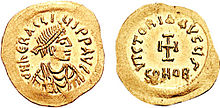Heraclius
| Heraclius | |||||
|---|---|---|---|---|---|

Tremissis of Emperor Heraclius.
|
|||||
| Emperor of the Byzantine Empire | |||||
| Reign | October 5, 610 – February 11, 641 | ||||
| Coronation | October 5, 610 | ||||
| Predecessor | Phocas | ||||
| Successor |
Constantine III Heraklonas |
||||
| Born | c. 575 Cappadocia, present-day Turkey |
||||
| Died | February 11, 641 (aged 65 or 66) | ||||
| Spouse |
Eudokia Martina |
||||
| Issue |
Constantine III Heraklonas John Athalarichos (illegitimate) |
||||
|
|||||
| Dynasty | Heraclian Dynasty | ||||
| Father | Heraclius the Elder | ||||
| Mother | Epiphania | ||||
| Full name | |
|---|---|
| Flavius Heraclius |
| Heraclian dynasty | |||
| Chronology | |||
| Heraclius | 610–641 | ||
| with Constantine III as co-emperor, 613–641 | |||
| Constantine III | 641 | ||
| with Heraklonas as co-emperor | |||
| Heraklonas | 641 | ||
| Constans II | 641–668 | ||
| with Constantine IV (654–668), Heraclius and Tiberius (659–668) as co-emperors | |||
| Constantine IV | 668–685 | ||
| with Heraclius and Tiberius (668–681), and Justinian II (681–685) as co-emperors | |||
| Justinian II | 685–695, 705–711 | ||
| with Tiberius as co-emperor, 706–711 | |||
| Succession | |||
|
Preceded by Justinian dynasty and Phocas |
Followed by Twenty Years' Anarchy |
||
Heraclius (Latin: Flavius Heraclius Augustus, Greek: Φλάβιος Ἡράκλειος' c. 575 – February 11, 641) was the Emperor of the Byzantine Empire from 610 to 641.
He was responsible for introducing Greek as the Eastern Roman Empire's official language. His rise to power began in 608, when he and his father, Heraclius the Elder, the exarch of Africa, led a revolt against the unpopular usurper Phocas.
Heraclius's reign was marked by several military campaigns. The year Heraclius came to power, the empire was threatened on multiple frontiers. Heraclius immediately took charge of the Byzantine–Sassanid War of 602–628. The first battles of the campaign ended in defeat for the Byzantines; the Persian army fought their way to the Bosphorus but Constantinople was protected by impenetrable walls and a strong navy and Heraclius was able to avoid total defeat. Soon after, he initiated reforms to rebuild and strengthen the military. Heraclius drove the Persians out of Asia Minor and pushed deep into their territory, defeating them decisively in 627 at the Battle of Nineveh. The Persian king Khosrau II was overthrown and executed by his son Kavadh II, who soon sued for a peace treaty, agreeing to withdraw from all occupied territory. This way peaceful relations were restored to the two deeply strained empires.
Heraclius soon experienced a new event, the Muslim conquests. Emerging from the Arabian Peninsula, the Muslims quickly conquered the Sassanid empire. In 634 the Muslims marched into Roman Syria, defeating Heraclius' brother Theodore. Within a short period of time, the Arabs conquered Mesopotamia, Armenia and Egypt.
...
Wikipedia
